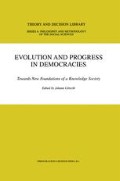Abstract
At the end of the 20th century, evidence backing one central hypothesis has increased substantially: in a nutshell, this hypothesis (to be formulated more precisely later) amounts to stating that by sociocultural transformations and evolutionary stochastic processes new bases and/or conditions have developed resulting in a new dynamic mode of both knowledge production and a new type of knowledge realization. This heightens the evidence for the proposition that scientific creativity and scientific knowledge are becoming the foremost and decisive questions within the evolutionarily selforganizing development of democracies. We are dealing here with the type of modern democracy constituting the internal transformation of a society processing materials to a society processing information — appropriately termed the knowledge society.
Access this chapter
Tax calculation will be finalised at checkout
Purchases are for personal use only
Preview
Unable to display preview. Download preview PDF.
Notes
Götschl, J., “The Study of Nature and the Emergence of World-View. Philosophical Reflections on Erwin Schrödinger’s Approach”, in: Götschl, J. (ed.), Erwin Schrödinger’s World View. The Dynamics of Knowledge and Reality, Kluwer Academic Publishers, Dordrecht, 1992, 173–183.
Götschl, J., “Selforganization: New Foundations Towards a ‘General Theory of Reality—, in: Götschl, J. (ed.), Revolutionary Changes in Understanding Man and Society (Scopes and Limits), Kluwer Academic Publishers, Dordrecht/Boston/London, 1995, 109–129.
Leinfellner, W., “The New Theory of Evolution — A Theory of Democratic Societies, in: Götschl, J. (ed.), Revolutionary Changes in Understanding Man and Society (Scopes and Limits), Kluwer Academic Publishers, Dordrecht/Boston/London, 1995, 149–189.
The technical peculiarities resulting from these differing representations will not be discussed here. A different argument for the principal incompleteness of theories is made by Hilary Putnam in the paper: “Degree of confirmation and inductive logic”. Putnam renders explicit the fact of the incompleteness of theories on the basis that for each theory a more powerful one can in principle be formulated. Cf. Putnam, H., “Degree of confirmation and inductive logic”, in: Putnam, H., Mathematics, Matter and Method. Philosophical Papers, Vol. 1,2nd edition, Cambridge University Press, 1979, 270 — 292.
The elaboration of the dynamic correspondence relation was based on cooperation between J. Götschl, J. Papst and A. Resetarits: Gibt es neue Voraussetzungen der Produktion von Wissen? Eine philosophisch-wissenschaftliche Untersuchung der gegenwärtigen Trends,Ludwig Boltzmann Institut für Wissenschaftsforschung, Karl-Franzens University, Graz, October 1999, (unpublished research paper).
A parallel to these results can be found in work on connectionist networks. Compare in particular the function of hidden units in Sejnowski’s NETtalk experiment. The fact that the first connectionist experiments were controlled through supervision can be ignored here. Sejnowski, T. J. and Rosenberg, C. R., NETtalk: A Parallel Network that Learns to Read Aloud, John Hopkins University, TR JHU/EECS-86/01, 1986. Cf. Smolensky’s attempt to combine the connectionist approach of symbol processing with the classical approach.
Kinshourne, M., ‘Das Bewusstsein und die funktionelle Organisation des menschlichen Gehirns“, in: Baier, W. (ed.): Bewusstsein. Auf der Suche nach dem Selbst; Die Wissenschaft vom Bewusstsein und vom Denken,Protokollband zur Urania-Vortragsreihe, Leykam, Graz, 1999. Kinsbourne, M., ”Dynamic Selforganization of the Cerebral Network: Evidence from Neuropsychology“, in: Götschl, J. (ed.): On Dynamics of Modern, Complex, Social and Democratic Systems,Kluwer Academic Publishers, Dordrecht/Boston/London (in appearance).
Smolensky, P., “Constituent structure and explanation in an integrated connectionist/symbolic cognitive architecture”, in: Macdonald, C. & Macdonald, M. (ed.), Connectionism: Debates on Psychological Explanation, Volume Two. Basil Blackwell, Oxford, 1995, 221–290. Also Smolensky, P., “Computational, dynamic, and statistical perspectives on the processing and learning problems in neural network theory”, in: Smolensky, P., Mozner, M. and Rumelhart, D. (ed.), Mathematical Perspectives on Neural Networks, Lawrence Erlbaum Publishers, Mahwah, NJ, 1996, 1–13.
Götschl, J., “Selforganization: Epistemological and Methodological Aspects of the Unity of Reality” in: A. Carsetti (ed.), Functional Models of Cognition. Selforganizing Dynamics and Semantic Structures in Cognitive Systems, Kluwer Academic Publishers, Dordrecht/Boston/London, 2000.
Leinfellner, W., “Towards a Theory of Selforganization, Societal Evolution, Selforganization and Creativity, and the Role of Randomizers in the Societal Evolution”, in: Götschl J. (ed.), Evolution and Progress in Democracies. Towards New Foundations of a Knowledge Society,Kluwer Academic Publishers, Dordrecht/Boston/London (in appearance).
Leinfellner, W., “The New Theory of Evolution — A Theory of Democratic Societies, in: Götschl, J. (ed.), Revolutionary Changes in Understanding Man and Society (Scopes and Limits), Kluwer Academic Publishers, Dordrecht/Boston/London, 1995, 149–189.
Harsanyi, John, C., “Games with Incomplete Information. Nobel Memorial Lecture, December 9, 1994”, in: Götschl J. (ed.), On Dynamics of Modern, Complex, Social and Democratic Systems,Kluwer Academic Publishers, Dordrecht/Boston/London (in appearance).
Götschl, J., Papst, J. and Resetarits, A.: Gibt es neue Voraussetzungen der Produktion von Wissen? Eine philosophisch-wissenschaftliche Untersuchung der gegenwärtigen Trends,Ludwig Boltzmann lnsitut für Wissenschaftsforschung, Karl-Franzens University, Graz, October 1999, (unpublished research paper).
Leinfellner, W.: “Game Theory, Sociodynamics and Cultural Evolution, in: W. Leinfellner/E. Köhler (ed.): Game Theory, Experience, Rationality. Kluwer Academic Publishers, Boston, 1998, 197–210
Author information
Authors and Affiliations
Editor information
Editors and Affiliations
Rights and permissions
Copyright information
© 2001 Springer Science+Business Media Dordrecht
About this chapter
Cite this chapter
Götschl, J. (2001). On Evolutive Dynamics of Knowledge Production. Some Implications for Democracy. In: Götschl, J. (eds) Evolution and Progress in Democracies. Theory and Decision Library, vol 31. Springer, Dordrecht. https://doi.org/10.1007/978-94-017-1504-1_5
Download citation
DOI: https://doi.org/10.1007/978-94-017-1504-1_5
Publisher Name: Springer, Dordrecht
Print ISBN: 978-90-481-5842-3
Online ISBN: 978-94-017-1504-1
eBook Packages: Springer Book Archive

